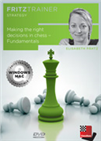Three decisive results
By Milan Dinic, FIDE's Press Officer
Round one saw a fiery start to the final leg of the 2024/2025 FIDE Women's Grand Prix. IM Olga Badelka upset the former women's world champion Alexandra Kosteniuk, Vaishali Rameshbabu capitalised on Nurgyul Salimova's time trouble and Tan Zhongyi emerged victorious as black against Zhu Jiner in a marathon five-and-a-half-hour game.
A strong start for the host country as Badelka, representing Austria, defeated former women's world champion Kosteniuk. Despite being lower-rated and under time pressure, Badelka held her nerve and turned the tables in a sharp battle.
One of the event's favourites, Zhu, was under pressure and defended for a long time against Tan. Though both players missed chances in a complicated position, Zhu eventually cracked in a bishop v. rook endgame.
Vaishali edged out Salimova in a balanced game, where better time management and control over the dark squares proved decisive.
The Muzychuk sisters drew quickly in a short game. By contrast, Lela Javakhishvili and Nana Dzagnidze of Georgia fought for over five hours before agreeing to a draw in a gruelling, evenly contested game.
Round 1 results
The tension at the start
The small G'Schlössl Murtal in the southern Austrian hills was abuzz with tension as ten chess players arrived for the first round in the final battle of the Women’s Grand Prix.
After clearing the Fair Play checks - which ensured no phones or electronic devices were brought in - the players took their seats. The venue, a picturesque orangery nestled in a tranquil park, offered a calming view as they settled in for round one.
 The King‘s Indian Attack is a universal opening: easy to learn, flexible, and rich in both tactical and positional opportunities.
The King‘s Indian Attack is a universal opening: easy to learn, flexible, and rich in both tactical and positional opportunities.At 3 p.m. sharp, Chief Arbiter Gerhard Bertagnolli of Italy signalled the start of play. The President of the Austrian Chess Federation, Michael Stöttinger, made the ceremonial first move in the game between Austria's Olga Badelka and former women's world champion Alexandra Kosteniuk.
As the clocks began to tick, the final leg of a six-tournament campaign was officially underway. But this Austrian stage will not be like the others. Instead, it will be the final verdict of the 2024/25 FIDE Women’s Grand Prix.

The President of the Austrian Chess Federation, Michael Stöttinger, playing the honorary first move in the inaugural round | Photo: Przemysław Nikiel
Here’s a closer look at the games from round one.
Olga Badelka v. Alexandra Kosteniuk, 1-0
The most exciting game of the round was played between the home player IM Olga Badelka (who commanded the white pieces) and GM Alexandra Koteniuk, representing Switzerland. Badelka chose the sharp Marshall Gambit in the Triangle Slav, signalling her intent to play for complications.
In this well-known position, Kosteniuk has just snatched the g2-pawn with 9…Qxg2, which is considered to be very risky for Black.
Unsurprisingly, the evaluation bar raced up for White immediately. The engine recommended the cold-blooded 10.Qd2 - inviting Black to take the rook on h1 and walk into a likely ambush. Another well-known line starts with 10.Bf3 and also promises an advantage for White. However, Badelka played the more natural-looking 10.Qd6. After 10…Bd7 11.Bf3 Qg5 12.Rd1 0-0-0 Badelka, down two pawns, was compelled to keep pressing.
The opponents traded errors in a very complicated position at this stage. Eventually, Kosteniuk grabbed her third extra pawn - emerging with a clear material advantage and a healthy lead on the clock.
Badelka tried her last chance, throwing everything in, playing for time and trying to stay in the game. Somewhat surprisingly, it worked out for her! The last critical position emerged on move 35.
Black is clearly better, but has to decide how to deal with her g7-pawn. Kosteniuk played 35…g6? (instead of the much stronger 35…g5!) which marked the beginning of her collapse.
After 36.Qxh6 Rd4? 37.Qf8 Rd8? 38.h6 the tables turned completely: White advanced her h-pawn, regained the initiative and, within easy reach of move 40, escaped time trouble.
The rest was a smooth sail for Badelka who won on move 43.
The game was a fortunate break for the young Austrian IM. Despite being the underdog and in time trouble, she followed the cardinal rule: keep playing, don't blunder and survive to move 40. In the end, it was Kosteniuk who misplayed it all and lost.
In the post-game interview, Badelka said she was "tired, excited and stressed" at the same time, noting that staying focused on the position and just wanting to "survive" kept her going.
With just 25 points in the WGP, Badelka is not in contention for the top overall places. However, this victory is a welcome start for this event - not just for her, but also for Austria, as one of their own opens the tournament with a win on home soil.
Vaishali Rameshbabu v. Nurgyul Salimova, 1-0
Roughly ten minutes before Badelka sealed her win, India's Vaishali Rameshbabu defeated Bulgaria's Nurgyul Salimova.
The youngest player in the tournament, 21-year-old Salimova, opted for the Caro-Kann and the opponents quickly entered uncharted waters. Vaishali grabbed advantage early on but played somewhat sluggishly, and with a timely move 14…c5, Black equalised. By move 19, the queens were off the board, but White had a slight edge thanks to a knight v. a "bad" bishop.
At some point, Salimova should have temporarily sacrificed her b3-pawn to activate her pieces, but she opted for a passive approach, allowing Vaishali to gradually take control.
 In a total of 6 chapters, we look at the following aspects: the right decision based on tactical factors, decisions in exchanges and moves, complex and psychological decisions in longer games and in defence.
In a total of 6 chapters, we look at the following aspects: the right decision based on tactical factors, decisions in exchanges and moves, complex and psychological decisions in longer games and in defence.White is now winning. Soon, Vaishali captured the b3-pawn. With two queenside runners, it was a matter of technique - one Salimova didn't care to test. She resigned on move 35.
A great start for the Indian superstar in her third tournament of the year.

Nurgyul Salimova | Photo: Przemysław Nikiel
Zhu Jiner v. Tan Zhongyi, 0-1
The longest game of the day – lasting five and a half hours – was played between one of the favourites, Zhu Jiner, and former women's world champion Tan Zhongyi.
In the Classical Ruy Lopez, the opponents waged a protracted positional battle in a balanced game. A characteristic of this opening, but near the time control it turned into a real rollercoaster.
The position is about equal, but both have to be very careful.
38.Nd6?? A serious mistake, handing Black a decisive advantage. After 38…Bxd6 39.Rxb5 Rxb5 40.exd6 Black emerged an exchange up, with a runner on the a-file and controls the main files.
However, Tan did not demonstrate the necessary accuracy. She first lost the central pawn and then gave up her a-passer. Zhu stayed in the game, defended, but her position was still beyond repair.
Things changed drastically on move 71 when Tan dropped her advantage completely and the position became equal. With queens exchanged, the game reached a bishop v. rook endgame - White holding three pawns to Black's two. Zhu sensibly gave up a pawn to build a fortress, but after the final mistake on move 87 it collapsed.
White should have kept her king on f2 and f3, controlling the critical e3-square and moving her bishop along the long diagonal. Instead, Zhu played 87.Bf3?? allowing Black's king to penetrate to e3 after 87…Rc2+ 88.Kg1 (88.Be2 Ke4!) Ke3!
The rest was an easy ride for Black. After some preparation, Tan played g6-g5 and forced White’s resignation due to the imminent loss of her g3-pawn.

Zhu Jiner playing white against Tan Zhongyi in an all-Chinese duel, while Nurgyul Salimova looks on | Photo: Przemysław Nikiel
Lela Javakhishvili v. Nana Dzagnidze, ½–½
In the Reti, Javakhishvili gained a slight edge early on, but after the queens came off on move 15, a long and difficult fight lay ahead for both sides.
The players tested each other with subtle traps, but neither blinked. By move 35 they entered a roughly equal rook endgame. After losing her a-passer, Javakhishvili found herself defending a 3 v. 4 rook endgame, but was up to the challenge, and the two agreed upon splitting a point on move 70.
 In this video course, experts (Pelletier, Marin, Müller and Reeh) examine the games of Judit Polgar. Let them show you which openings Polgar chose to play, where her strength in middlegames were, or how she outplayed her opponents in the endgame.
In this video course, experts (Pelletier, Marin, Müller and Reeh) examine the games of Judit Polgar. Let them show you which openings Polgar chose to play, where her strength in middlegames were, or how she outplayed her opponents in the endgame.A long day for both seasoned Georgian players.

Lela Javakhishvili and Nana Dzagnidze | Photo: Przemysław Nikiel
Mariya Muzychuk v. Anna Muzychuk, ½–½
In a brief encounter, Mariya Muzychuk drew with her sister Anna in the Closed Catalan. This outcome was expected, as often when they play together in events, the two Ukrainians are always paired with one another in the first round.
Still, the stakes are higher for Mariya, who retains an outside shot at the Grand Prix title. The former women's world champion has a mathematical chance to win the Grand Prix series if she delivers a stellar performance and claims sole first place.
Asked about whether this impacted her approach to the event, Anna said: "I think it's best to focus on the games and play your best and see how things stand in the end. Then I might change my strategy".

Mariya Muzychuk and Anna Muzychuk | Photo: Przemysław Nikiel
Standings
All games
Links
























